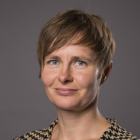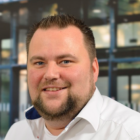Panel Discussion EDT106
Real or Remote? Next-level Laboratory Education
Date Thursday, Nov 28 Time – Room: Bishop
Remote Controlled Laboratories (RCL) offer access to hardware set-ups (e.g. chemical processes, robots, factory models) that are located in real laboratories. In contrast to simulation-based solutions, RCL offer students the opportunity to engage with real-world challenges. However, as set-ups are tailored to specific courses, our ability to gain better understanding of successful key features and pedagogical concepts is often limited. Based on use cases, we will discuss a new concept for open, configurable remote laboratories to take remote labs to the next level.

André Dietrich
Researcher, Otto-von-Guericke University, Germany
I am originally a robotics and embedded software developer at the University of Magdeburg, who became obsessed with programming paradigms.
Due to my participation in the “Industrial eLab” project, which tries to make university hardware online accessible to students anytime and anywhere, I had to shift to web-development.
Developing educational content for this purpose with the common Learning Management Systems (LMS) and authoring-tools was simply not satisfying and did not meet my expectations. So I started to design my own “markup” language for creating free and open educational content that integrates everything that I liked or missed from other authoring systems ...
Links

Anja Hawlitschek
Research Associate, University of Applied Science Magdeburg, Germany
Dr. Anja Hawlitschek is currently working as research associate at Magdeburg-Stendal University of Applied Sciences in the project “Industrial eLab”. This project which is funded by the German Federal Ministry of Education and Research addresses the usage of remote laboratories for teaching and learning. Her research focuses on instructional design for blended learning, e-learning and game-based learning.

Tobias R. Ortelt
Digital Learning Expert, TU Dortmund University, Germany
Tobias R. Ortelt graduated in Mechanical Engineering (Design Engineering and Automation Engineering) at the Ruhr-Universität Bochum in 2012.
From 2012 to March 2019 he was a research associate at the Insitute of Forming Technology and Lightweight (IUL) Compontnes at TU Dortmund University He was in charge for the developmebt of a remote lab for material testing in the project “ELLI - Excellent Teaching and Learning in Engineering Sciences”. From 2016 he was head of the department “Engineering Education and Remote Manufacturing” at IUL.
Sinc 2018 he is speaker of the Community Working Group "Remote Labs in Germany" and a member of the group "Digital Teaching and Learning at TU Dortmund University".
Since April 2019 he is a reasearch associate and Digital Learning Expert at the entity EngineeringEducation at the Faculty of Mechanical Engineering at TU Dortmund University.
His research focus is on engineering education, remote labs, digital learning and Industry 4.0.
Links

Sebastian Zug
Professor, Technical University Bergakademie Freiberg, Germany
Sebastian Zug is a Professor at the TU Bergakademie Freiberg. His research interests are focused on outdoor robotics and self-describing, intelligent components.
Based on a broad experience in bachelor and master course in programming and embedded systems, he develops new concepts for practical oriented engineering courses. This includes new open source course materials including interactive programming sessions, simulation tools and remote access on laborartory equipments. Sebastian Zug is the coordinator of two national projects addressing challenges of remote laboratories and eLearning environments.
